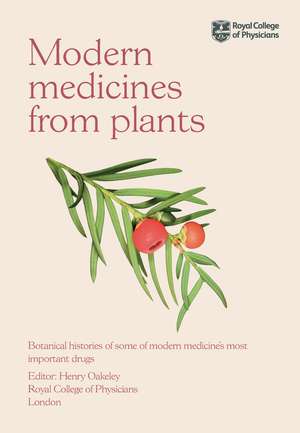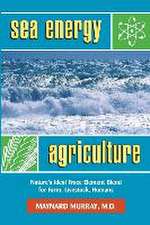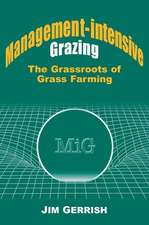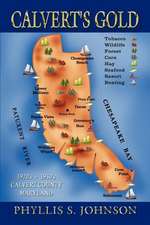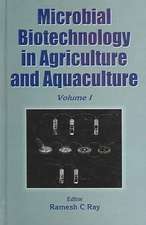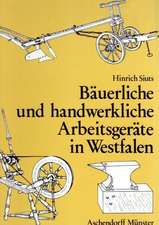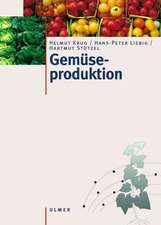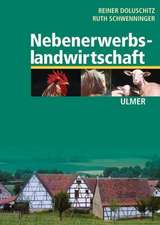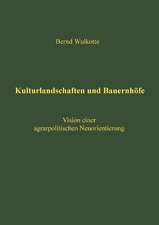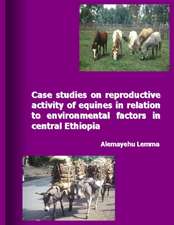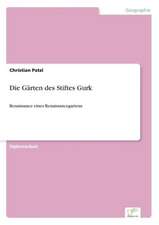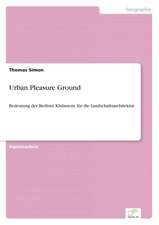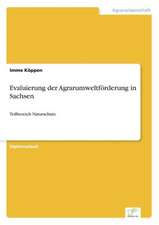Modern Medicines from Plants: Botanical histories of some of modern medicine’s most important drugs
Editat de Henry Oakeleyen Limba Engleză Paperback – 17 aug 2023
This amazing and unique book is a wonderful read for those with an interest in both herbal and prescription medicines. Written with authority by physicians and gardeners at the Garden of Medicinal Plants at the Royal College of Physicians, London, chapters detail the history and modern scientific research on plants and their medicines. It is very useful to physicians, pharmacists, herbalists, historians and gardeners, bringing together information from every discipline to make it a work of interest as well as reference.
Features
- Written for people interested in medicinal plants, where medicines come from, and how they treat our diseases
- Contains information on 50 plants, mostly growing in the medicinal garden of the Royal College of Physicians in London, describing how they became the source of modern pharmaceutical medicines
- Describes medicinal uses of plants in Classical Greece as written by Dioscorides, Pliny and Galen, through the flowering of Arabic medicine by physicians such as Paulus Aegineta, Mesue and Avicenna to the 12th to 14th century compilations of Serapion and Sylvaticus and the European Renaissance of Peter Treveris, William Turner, Leonard Fuchs, Pietro Mattioli, John Gerarde, John Parkinson, Nicholas Culpeper, and many others to the pharmacopoeias of the 16th century to the present day
- Fully referenced including a glossary for explanation of technical terms
| Toate formatele și edițiile | Preț | Express |
|---|---|---|
| Paperback (1) | 231.56 lei 3-5 săpt. | +47.56 lei 5-11 zile |
| CRC Press – 17 aug 2023 | 231.56 lei 3-5 săpt. | +47.56 lei 5-11 zile |
| Hardback (1) | 521.39 lei 3-5 săpt. | +43.03 lei 5-11 zile |
| CRC Press – 26 iul 2023 | 521.39 lei 3-5 săpt. | +43.03 lei 5-11 zile |
Preț: 231.56 lei
Nou
Puncte Express: 347
Preț estimativ în valută:
44.31€ • 46.09$ • 36.58£
44.31€ • 46.09$ • 36.58£
Carte disponibilă
Livrare economică 24 martie-07 aprilie
Livrare express 08-14 martie pentru 57.55 lei
Preluare comenzi: 021 569.72.76
Specificații
ISBN-13: 9781032536170
ISBN-10: 1032536179
Pagini: 394
Ilustrații: 171 Halftones, color; 171 Illustrations, color
Dimensiuni: 178 x 254 x 22 mm
Greutate: 1.24 kg
Ediția:1
Editura: CRC Press
Colecția CRC Press
Locul publicării:Boca Raton, United States
ISBN-10: 1032536179
Pagini: 394
Ilustrații: 171 Halftones, color; 171 Illustrations, color
Dimensiuni: 178 x 254 x 22 mm
Greutate: 1.24 kg
Ediția:1
Editura: CRC Press
Colecția CRC Press
Locul publicării:Boca Raton, United States
Public țintă
Academic, General, and Undergraduate CoreCuprins
Introduction 1. Ammi majus – ammi, false Queen Anne’s lace, bullwort, bishop’s weed, herb william – ethoxsalen (8-methoxypsoralen) 2. Artemisia annua – sweet wormwood, annual wormwood, Qing-Hao – artemesinin and derivatives 3. Atropa belladonna – deadly nightshade; Datura stramonium – Jimson weed; and Mandragora, Hyoscyamus, Brugmansia, Scopolia – atropine and hyoscine 4. Betula pendula – silver birch - β-sitosterol 5. Camellia sinensis - tea; Coffea arabica – coffee; Theobroma cacao – chocolate – caffeine, theophylline 6. Camptotheca acuminata – camptotheca – camptothecin, topotecan and irinotecan 7. Capsicum annuum – chilli pepper – capsaicin 8. Catharanthus roseus – Madagascar periwinkle, Cayenne Jasmine, old maid, rosy periwinkle – vincristine, vinblastine 9. Cephalotaxus harringtonia – Chinese plum yew – harringtonine 10. Chondrodendron tomentosum – curare vine – tubocurarine 11. Cinchona species – quinine tree, Jesuit’s bark, Peruvian bark – quinine, quinidine 12. Citrus x limon – lemon – vitamin C 13. Colchicum autumnale – meadow saffron, autumn crocus, naked ladies – colchicine 14. Digitalis purpurea – purple foxglove – digitoxin; Digitalis lanata – woolly foxglove – digoxin 15. Dioscorea polystachya – yam; Glycine max – soybean – steroids 16. Ephedra sinica – Joint pine, Mormon tea – ephedrine, ecstasy 17. Erythroxylum coca – coca bush – cocaine 18. Euphorbia peplus – common spurge – ingenol mebutate 19. Galanthus nivalis – snowdrop – galantamine 20. Galega officinalis – goat’s rue – phenformin, metformin 21. Glycyrrhiza glabra – liquorice – carbenoxolone, glycyrrhizic acid 22. Guaiacum officinale – roughbark lignum-vitae, guaiacwood – alpha-guaiaconic acid 23. Hordeum jubatum – foxtail barley; Arundo donax – giant reed – lignocaine (lidocaine) and derivatives 24. Hordeum vulgare, Claviceps purpurea – common barley, ergot – ergometrine, ergotamine 25. Hydrangea febrifuga – Asian hydrangea, Chinese quinine – febrifugine, methaqualone, halofuginone 26. Illicium verum – Chinese star anise; I. anisatum – Japanese Star Anise – oseltamivir 27. Inula helenium – elecampane, enula, horseheal, scabwort, wild sunflower – inulin 28. Melilotus officinalis – melilot, ellow weet clover, king’s clover, yellow melilot – warfarin 29. Morus alba – white mulberry – miglustat, miglitol 30. Nicotiana tabacum – tobacco – nicotine, with a note on Lobelia – lobeline, and Laburnum anagyroides – cytisine 31. Papaver rhoeas – corn or Flander’s poppy – rhoeadine, thebaine, oxycodone, etorphine and other derivatives 32. Papaver somniferum – opium poppy – morphine, codeine, noscapine, protopine 33. Physostigma venenosum – Calabar bean – physostigmine 34. Pilocarpus microphyllus – jaborandi – pilocarpine 35. Podophyllum peltatum – Mayapple, American mandrake, Ground lemon; Podophyllum hexandrum – Himalayan mayapple – podophyllotoxin, etoposide, teniposide 36. Rauvolfia serpentina – snake root – reserpine 37. Salix alba – willow; Filipendula ulmaria – meadowsweet; Gaultheria procumbens – wintergreen – aspirin, salicylic acid and methyl salicylate 38. Silybum marianum – milk thistle – silymarin, Legalon-SIL 39. Tanacetum cineriifolium – pyrethrum, Dalmation chrysanthemum – pyrethrins 40. Taxus baccata – European yew; Taxus brevifolia –Pacific yew – paclitaxel and derivatives 41. Valeriana officinalis – valerian – sodium valproate 42. Veratrum album, V. nigrum – false hellebores – protoveratrine – V. californicum – cyclopamine and sonidegib 43. Visnaga daucoides – khella – nifedipine, amiodarone, sodium cromoglicate, nedocromil sodium 44. Excipients and Solvents 45. Vitamins
Recenzii
"Modern medicine from plants" is a very accessible addition to any collection of books on nature and how we might benefit from its gentle management and sensitive interaction, especially when we need help "on the fly" or in the field.” G. Carlo Laurenzi OBE - former CEO of the Wildlife Trust; London; adviser to DEFRA; past member of the founding board of Rewilding Britain; and a long-time forager and bushcrafter.
Notă biografică
Henry Oakeley is a retired consultant psychiatrist who has been interested in plants since the age of eight and an international authority on a group of South American orchids, on which he has written the definitive monograph and held the UK National Collections. Sometime adviser to the Chelsea Physic Garden, Honorary Research Associate at Kew and Singapore Botanic Gardens; chairman of the RHS Orchid Committee, RHS Council Member and currently RHS Vice President. He has lectured on orchids and exhibited them around the world; written over 250 articles on orchids and written (or co-authored) ten books relating to plants and their uses, and others on the English Civil War, the Anglo Boer war, and medical biographies. Since 2005 he has been Garden Fellow at the Royal College of Physicians, London where he lectures on the plants in the Medicinal Garden. His orchid herbarium and drawings have been deposited at Kew, and his medicinal plant and orchid photographic archives at Kew and elsewhere. His current interest is in documenting the change of use of medicinal plants over the past two millennia.
Anthony Dayan was Professor of Toxicology in the University of London at Queen Mary University, London. He has been involved with the development and regulation of drugs and the safety of consumer products for more than 40 years in universities, official agencies in many countries and in the pharmaceutical industry. He has been Chairman of the British Toxicology Society and in 2014 the American College of Toxicology elected him Distinguished Scientist of the Year. He has been a Garden Fellow of the Royal College of Physicians since 2014, a co-author of A Garden of Medicinal Plants [50 plants in the College Garden from the history of Medicine]. He catalogued the Pharmaceutical Society Herbarium at the College with Professor Michael de Swiet. He has a particular interest in the historical aspects of the dual use of certain plants as foods and medicines. He has lectured to many University of the Third Age (U3A) groups and other organisations on toxic risks and on plants and medicines.
Anthony Dayan was Professor of Toxicology in the University of London at Queen Mary University, London. He has been involved with the development and regulation of drugs and the safety of consumer products for more than 40 years in universities, official agencies in many countries and in the pharmaceutical industry. He has been Chairman of the British Toxicology Society and in 2014 the American College of Toxicology elected him Distinguished Scientist of the Year. He has been a Garden Fellow of the Royal College of Physicians since 2014, a co-author of A Garden of Medicinal Plants [50 plants in the College Garden from the history of Medicine]. He catalogued the Pharmaceutical Society Herbarium at the College with Professor Michael de Swiet. He has a particular interest in the historical aspects of the dual use of certain plants as foods and medicines. He has lectured to many University of the Third Age (U3A) groups and other organisations on toxic risks and on plants and medicines.
Descriere
The full colour, beautifully illustrated Modern Medicines from Plants: Botanical histories of some of modern medicine’s most important drugs features information on plants from which we obtain modern prescription medicines.
